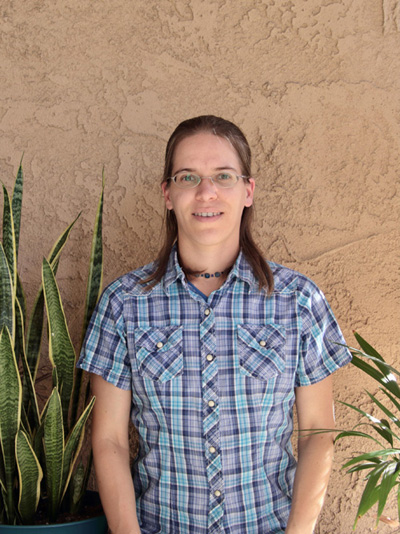23 October 2023–Gabrielle Tepp grew up in Michigan—far from the earthquakes and volcanoes she would later study. She also “grew up in a small city where ‘scientist’ wasn’t really a career path,” she recalls, but she was good at math and curious about how things worked. She thought she might like to become a veterinarian, but when her family got a tv cable package with the Science Channel, she was intrigued by shows on physics and astronomy.
She declared a double major of zoology and astrophysics in college—dropping the zoology after one semester. Tepp also plays a few musical instruments, which introduced her to the science of acoustics.
“I really liked acoustics and I really liked planetary science,” so when she came upon a seismology group in graduate school, “it seemed like both of my interests wrapped up together,” Tepp explains.
Her interdisciplinary leanings continue as a staff seismologist for the Southern California Seismic Network. Before joining the network, she was a postdoctoral fellow at the Alaska Volcano Observatory (AVO). Along the way she has worked in science policy and teaching, and she is still searching for another community orchestra to join with her violin.
Volcanoes interested her at first because she liked “the diversity of seismic and acoustic signals they produce,” she says. “Every volcano is unique, with some that have lots of precursor signals and some that have basically nothing.”

Her research in volcano seismology and hydroacoustics at AVO included work on signal detection, earthquake precursors and characterization of earthquake swarms. She has even done a little work on sonifying seismograms, to be able to hear what incoming seismic waves would sound like. “You need to speed them up because their frequencies are too low for human hearing,” she explains.
“And for volcanoes, these signals can go on for too long, and no one wants to listen to a sound they can’t hear for half an hour,” Tepp joked.
At AVO Tepp analyzed seismic and infrasound data in response to eruptions as a duty seismologist, a role that she continues at the Caltech network in response to magnitude 4 and larger earthquakes in southern California and northern Baja California, Mexico.
She is the lead on the network’s seismic analyst team, “responsible for maintaining a high-quality earthquake catalog. We use real-time data to find events, and then manually review the events to make sure earthquake locations and magnitudes are accurate and they’re not noise,” she said. She’s also involved with efforts to improve the catalog and monitoring systems, such as by incorporating modern machine learning algorithms.
“Most of the people I work with outside of our analysts are software developers and network engineers,” Tepp says “I’ve done coding for my own research, but I’ve had to learn a lot about how our real-time system works and all the moving parts.”
Her job at the network also puts her in front of the public and media occasionally, using some of the skills she learned through her experiences in teaching and science policy. Tepp was a 2015 SSA Geo-CVD grant recipient, which sent to her Washington, D.C. for policy training and visits with her congressional delegates. “It was a great experience, so I decided to do a little more,” she says. She spent three months in the Mirzayan Science & Technology Policy Fellowship Program at the National Academies of Science, Engineering and Medicine in Washington, D.C., working on science outreach about natural hazards, including helping to create a role-playing game about responding to earthquake disasters.
Another unexpected turn, Tepp says, was signing up to teach college writing in graduate school. “This isn’t why I chose to do it, and I didn’t expect that to happen,” she says, “but it made me a better writer and reviewer.”
“I like to take opportunities that are available and seem interesting, even if it’s something a little bit different,” she says. “I’ll keep wandering and see where I go next.”
One dream destination, Tepp says, is Antarctica, since it’s the only continent she hasn’t visited.
“I come from a small place in the Midwest,” she adds, “If you had told me when I was younger that I would travel the world, I’m not sure how I would’ve responded to that!”
SSA At Work is a monthly column that follows the careers of SSA members. For the full list of issues, head to our At Work page.
